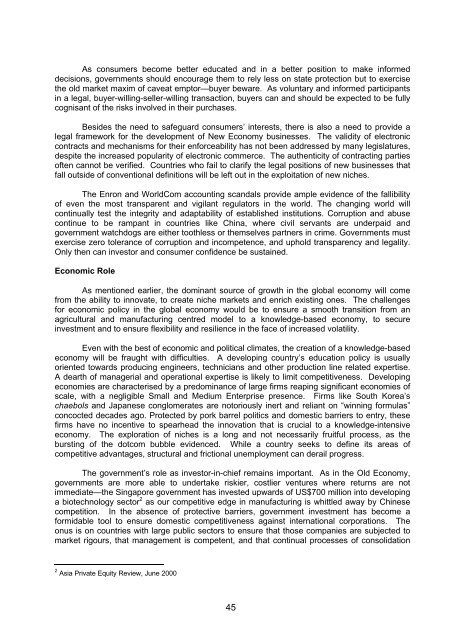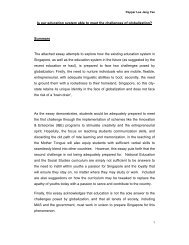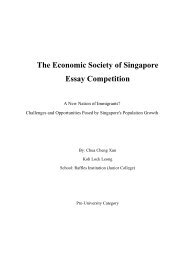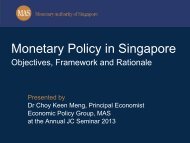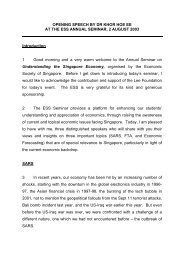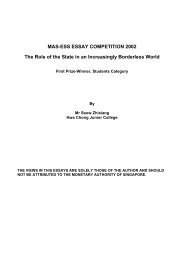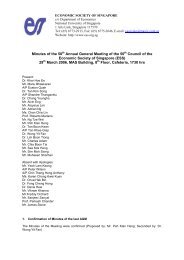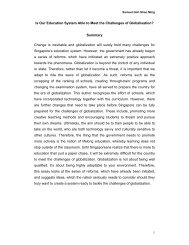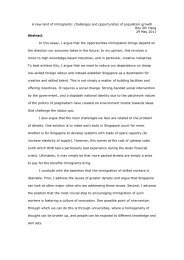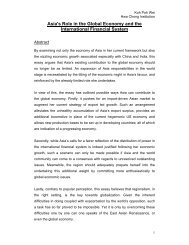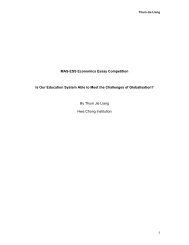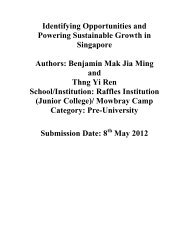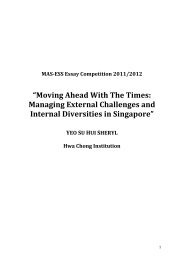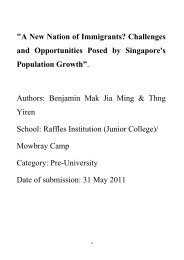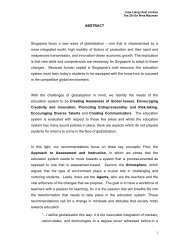the role of the state in an increasingly borderless world - Economic ...
the role of the state in an increasingly borderless world - Economic ...
the role of the state in an increasingly borderless world - Economic ...
- No tags were found...
You also want an ePaper? Increase the reach of your titles
YUMPU automatically turns print PDFs into web optimized ePapers that Google loves.
As consumers become better educated <strong>an</strong>d <strong>in</strong> a better position to make <strong>in</strong>formed<br />
decisions, governments should encourage <strong>the</strong>m to rely less on <strong>state</strong> protection but to exercise<br />
<strong>the</strong> old market maxim <strong>of</strong> caveat emptor—buyer beware. As voluntary <strong>an</strong>d <strong>in</strong>formed particip<strong>an</strong>ts<br />
<strong>in</strong> a legal, buyer-will<strong>in</strong>g-seller-will<strong>in</strong>g tr<strong>an</strong>saction, buyers c<strong>an</strong> <strong>an</strong>d should be expected to be fully<br />
cognis<strong>an</strong>t <strong>of</strong> <strong>the</strong> risks <strong>in</strong>volved <strong>in</strong> <strong>the</strong>ir purchases.<br />
Besides <strong>the</strong> need to safeguard consumers’ <strong>in</strong>terests, <strong>the</strong>re is also a need to provide a<br />
legal framework for <strong>the</strong> development <strong>of</strong> New Economy bus<strong>in</strong>esses. The validity <strong>of</strong> electronic<br />
contracts <strong>an</strong>d mech<strong>an</strong>isms for <strong>the</strong>ir enforceability has not been addressed by m<strong>an</strong>y legislatures,<br />
despite <strong>the</strong> <strong>in</strong>creased popularity <strong>of</strong> electronic commerce. The au<strong>the</strong>nticity <strong>of</strong> contract<strong>in</strong>g parties<br />
<strong>of</strong>ten c<strong>an</strong>not be verified. Countries who fail to clarify <strong>the</strong> legal positions <strong>of</strong> new bus<strong>in</strong>esses that<br />
fall outside <strong>of</strong> conventional def<strong>in</strong>itions will be left out <strong>in</strong> <strong>the</strong> exploitation <strong>of</strong> new niches.<br />
The Enron <strong>an</strong>d WorldCom account<strong>in</strong>g sc<strong>an</strong>dals provide ample evidence <strong>of</strong> <strong>the</strong> fallibility<br />
<strong>of</strong> even <strong>the</strong> most tr<strong>an</strong>sparent <strong>an</strong>d vigil<strong>an</strong>t regulators <strong>in</strong> <strong>the</strong> <strong>world</strong>. The ch<strong>an</strong>g<strong>in</strong>g <strong>world</strong> will<br />
cont<strong>in</strong>ually test <strong>the</strong> <strong>in</strong>tegrity <strong>an</strong>d adaptability <strong>of</strong> established <strong>in</strong>stitutions. Corruption <strong>an</strong>d abuse<br />
cont<strong>in</strong>ue to be ramp<strong>an</strong>t <strong>in</strong> countries like Ch<strong>in</strong>a, where civil serv<strong>an</strong>ts are underpaid <strong>an</strong>d<br />
government watchdogs are ei<strong>the</strong>r toothless or <strong>the</strong>mselves partners <strong>in</strong> crime. Governments must<br />
exercise zero toler<strong>an</strong>ce <strong>of</strong> corruption <strong>an</strong>d <strong>in</strong>competence, <strong>an</strong>d uphold tr<strong>an</strong>sparency <strong>an</strong>d legality.<br />
Only <strong>the</strong>n c<strong>an</strong> <strong>in</strong>vestor <strong>an</strong>d consumer confidence be susta<strong>in</strong>ed.<br />
<strong>Economic</strong> Role<br />
As mentioned earlier, <strong>the</strong> dom<strong>in</strong><strong>an</strong>t source <strong>of</strong> growth <strong>in</strong> <strong>the</strong> global economy will come<br />
from <strong>the</strong> ability to <strong>in</strong>novate, to create niche markets <strong>an</strong>d enrich exist<strong>in</strong>g ones. The challenges<br />
for economic policy <strong>in</strong> <strong>the</strong> global economy would be to ensure a smooth tr<strong>an</strong>sition from <strong>an</strong><br />
agricultural <strong>an</strong>d m<strong>an</strong>ufactur<strong>in</strong>g centred model to a knowledge-based economy, to secure<br />
<strong>in</strong>vestment <strong>an</strong>d to ensure flexibility <strong>an</strong>d resilience <strong>in</strong> <strong>the</strong> face <strong>of</strong> <strong>in</strong>creased volatility.<br />
Even with <strong>the</strong> best <strong>of</strong> economic <strong>an</strong>d political climates, <strong>the</strong> creation <strong>of</strong> a knowledge-based<br />
economy will be fraught with difficulties. A develop<strong>in</strong>g country’s education policy is usually<br />
oriented towards produc<strong>in</strong>g eng<strong>in</strong>eers, technici<strong>an</strong>s <strong>an</strong>d o<strong>the</strong>r production l<strong>in</strong>e related expertise.<br />
A dearth <strong>of</strong> m<strong>an</strong>agerial <strong>an</strong>d operational expertise is likely to limit competitiveness. Develop<strong>in</strong>g<br />
economies are characterised by a predom<strong>in</strong><strong>an</strong>ce <strong>of</strong> large firms reap<strong>in</strong>g signific<strong>an</strong>t economies <strong>of</strong><br />
scale, with a negligible Small <strong>an</strong>d Medium Enterprise presence. Firms like South Korea’s<br />
chaebols <strong>an</strong>d Jap<strong>an</strong>ese conglomerates are notoriously <strong>in</strong>ert <strong>an</strong>d reli<strong>an</strong>t on “w<strong>in</strong>n<strong>in</strong>g formulas”<br />
concocted decades ago. Protected by pork barrel politics <strong>an</strong>d domestic barriers to entry, <strong>the</strong>se<br />
firms have no <strong>in</strong>centive to spearhead <strong>the</strong> <strong>in</strong>novation that is crucial to a knowledge-<strong>in</strong>tensive<br />
economy. The exploration <strong>of</strong> niches is a long <strong>an</strong>d not necessarily fruitful process, as <strong>the</strong><br />
burst<strong>in</strong>g <strong>of</strong> <strong>the</strong> dotcom bubble evidenced. While a country seeks to def<strong>in</strong>e its areas <strong>of</strong><br />
competitive adv<strong>an</strong>tages, structural <strong>an</strong>d frictional unemployment c<strong>an</strong> derail progress.<br />
The government’s <strong>role</strong> as <strong>in</strong>vestor-<strong>in</strong>-chief rema<strong>in</strong>s import<strong>an</strong>t. As <strong>in</strong> <strong>the</strong> Old Economy,<br />
governments are more able to undertake riskier, costlier ventures where returns are not<br />
immediate—<strong>the</strong> S<strong>in</strong>gapore government has <strong>in</strong>vested upwards <strong>of</strong> US$700 million <strong>in</strong>to develop<strong>in</strong>g<br />
a biotechnology sector 2 as our competitive edge <strong>in</strong> m<strong>an</strong>ufactur<strong>in</strong>g is whittled away by Ch<strong>in</strong>ese<br />
competition. In <strong>the</strong> absence <strong>of</strong> protective barriers, government <strong>in</strong>vestment has become a<br />
formidable tool to ensure domestic competitiveness aga<strong>in</strong>st <strong>in</strong>ternational corporations. The<br />
onus is on countries with large public sectors to ensure that those comp<strong>an</strong>ies are subjected to<br />
market rigours, that m<strong>an</strong>agement is competent, <strong>an</strong>d that cont<strong>in</strong>ual processes <strong>of</strong> consolidation<br />
2 Asia Private Equity Review, June 2000<br />
45


